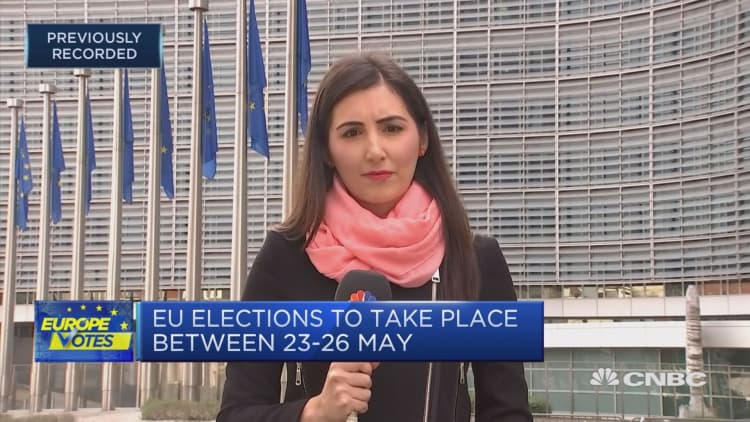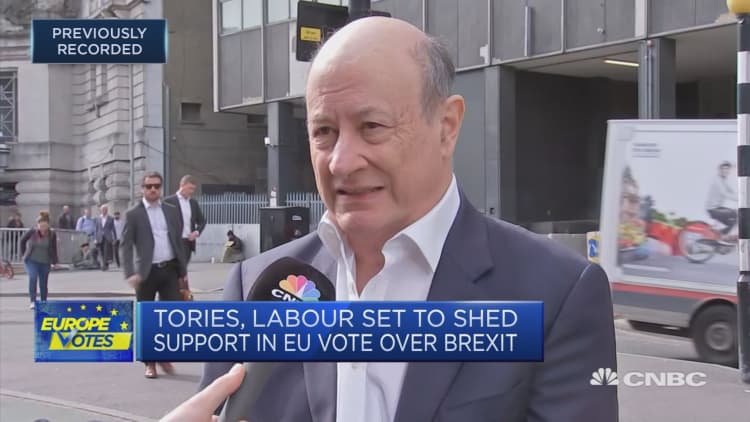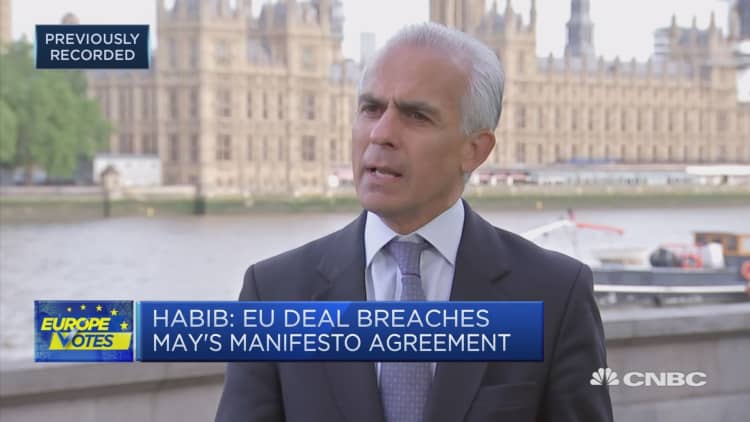British Prime Minister Theresa May has made a final attempt at persuading lawmakers to back her "new" Brexit deal on Wednesday but the agreement — and May's leadership — are already looking dead in the water.
On Tuesday, May made a last-ditch effort to save her Brexit deal by offering changes to an agreement that has already been rejected three times. But opposition parties have already said they oppose the new plan and members of her own party appear skeptical too.
She promised Tuesday to give lawmakers a vote on whether to hold a second Brexit referendum if they approve her withdrawal agreement. She also offered new guarantees on workers' rights, environmental standards, the Irish backstop and a "compromise" over a temporary customs union.
May said her revised deal "will deliver on the result" of the June 2016 referendum and said voting against the bill would mean "voting to stop Brexit." "Reject this deal and leaving the EU with a negotiated deal any time soon will be dead in the water," she said in speech.
May presented the arguments for her new "Withdrawal Agreement Bill" to Parliament on Wednesday but the sharks were already circling, with prominent members of her party and rivals to the leadership saying they'll oppose it.
Speaking to lawmakers, May said there needed to be "compromise on all sides of the debate" and laid out 10 commitments that the government was offering to address lawmakers' concerns. The bill will be published Friday. She said if Parliament passes the bill before the summer recess, "the U.K. will leave the EU by the end of July."
There are reports that some Conservative lawmakers could ask for rule changes that would allow May's leadership to be challenged in a no-confidence vote. May survived such a vote in December and current rules state a leader cannot be challenged for another 12 months.
Sterling fell on Wednesday to $1.2663, its lowest point since mid-January.

All change or no change?
May's offer of a vote on whether to hold a second referendum comes after months of refusing to consider such an idea, despite pressure from opposition parties to hold a so-called "People's Vote."
Labour has been more ambivalent over holding a second referendum and on Tuesday, leader Jeremy Corbyn said that his party would not be supporting May's new deal, calling it a "rehash" of the government's previous position. Corbyn and May held six weeks of cross-party talks in a bid to break an impasse over Brexit but those ended without any agreement on Friday.
Meanwhile, May's ruling Conservative Party is split with Remain and pro-Brexit members vying for influence over the direction of the EU withdrawal, and the party leadership itself.
May had offered her resignation if her lawmakers backed the deal, but it seems most don't want the deal and want May out sooner rather than later, putting a leadership contest and snap election on the cards.
Boris Johnson, a contender for the party leadership, tweeted on Tuesday that he would not support May's new proposals despite his support for her deal at the third "meaningful vote" (known as MV3) that was held earlier in the year.
A re-ignition of the Brexit drama comes ahead of European Parliament elections this week. The U.K. has to take part because it was granted an extension to its EU departure date (currently set for October 31).
The latest polling shows that the Brexit Party led by Nigel Farage (the U.K. Independence Party's former leader and a chief promoter of euroskepticism that led up to the 2016 referendum) is clearly in the lead ahead of the vote.
Polls show Labour in second, followed by the staunchly remain Liberal Democrats, and then trailed by May's Conservative Party.

Ben Habib, a candidate in the election for the Brexit Party, told CNBC that Parliament was "slip-sliding towards either a second referendum or a revocation or a general election."
"It's not just a matter of the Tories (Conservatives) getting their act together, Parliament itself is in the contempt of the people. What the Labour party want is not Brexit, what the Conservatives want is not Brexit," he told CNBC's Steve Sedgwick on Wednesday.
Jan Rostowski, a candidate for pro-Remain party Change U.K., told CNBC that "what we want to do is stop Brexit."
"The problem is that the attempt to get a soft Brexit is just in the process of coming up to its fourth hurdle and crashing down ... It's not an accident, it's because every form of Brexit — be it soft or hard — is worse than membership."
Eroded authority
Parliament could be given a fourth vote on the Brexit withdrawal bill in early June, a busy time in the U.K. with President Donald Trump making a state visit to the country. May's plan is still likely to fail and may not even be voted on, according to some experts, and she could also face another vote of no confidence.
"By now, her authority is so eroded that her latest attempt to finally resolve Brexit will likely fail. Instead, her proposal will probably extend the infighting in Parliament that has led to the Brexit impasse in the first place," Kallum Pickering, senior economist at Berenberg Bank, said in a note Tuesday.
"The House of Commons (the lower House of Parliament) has long been divided about whether the U.K. should remain in the Customs Union while past votes to hold a second referendum have fallen short of a majority. Even if May wins over some Labour MPs who want to push for a second referendum, she will lose Conservatives who fear that a second vote could reverse Brexit."



